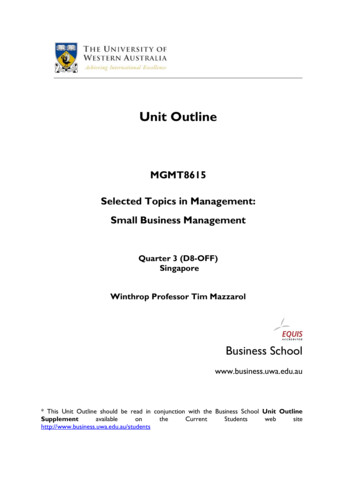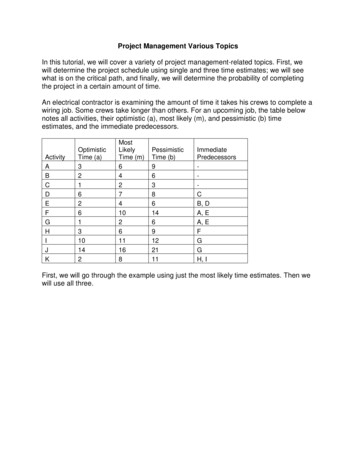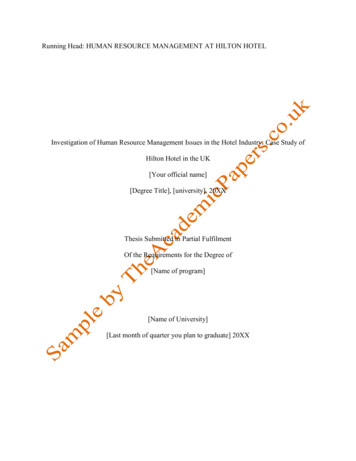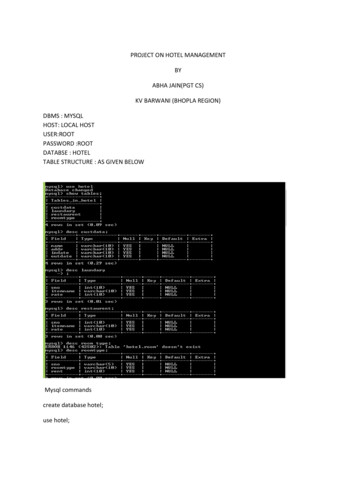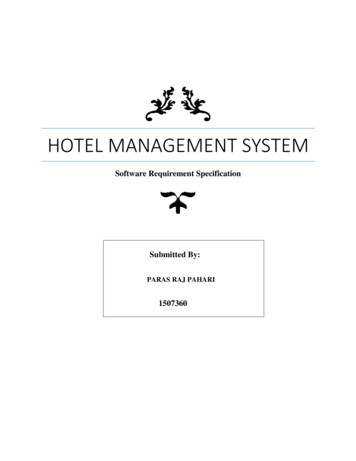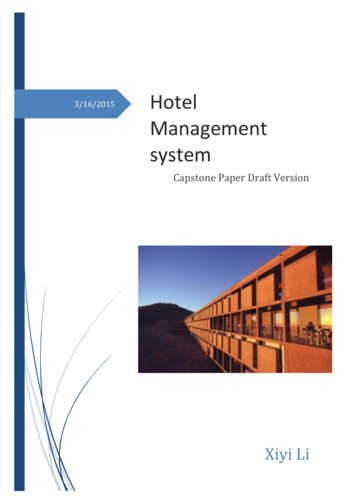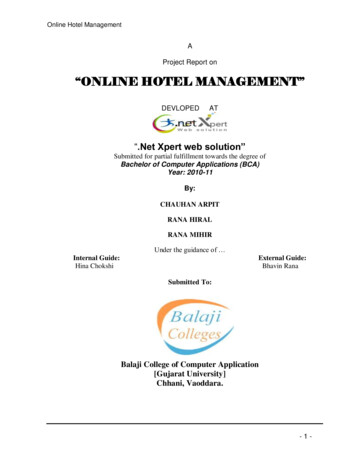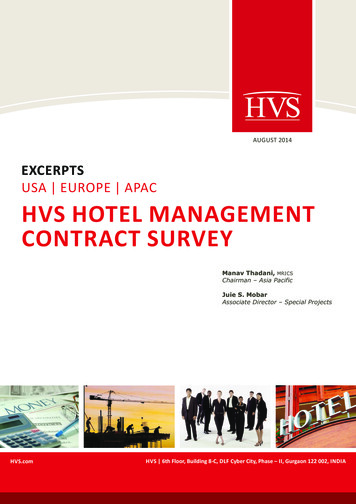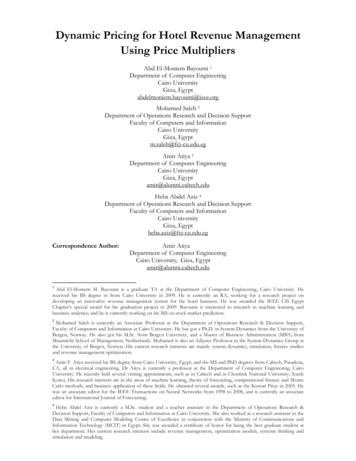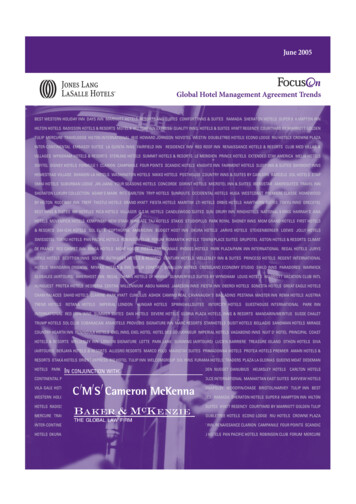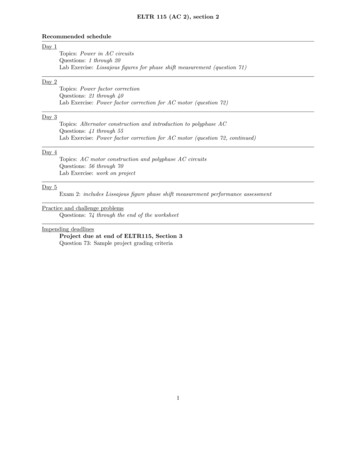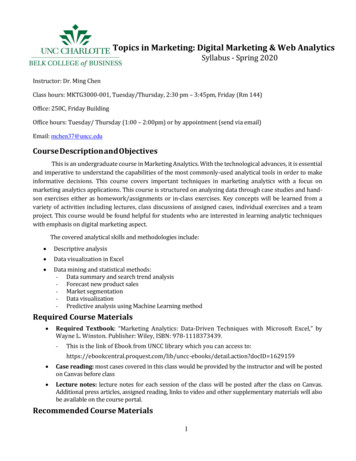
Transcription
Presenting a live 90-minute webinar with interactive Q&AHotel Management Agreements:Ten Topics for 2015 and BeyondNavigating Agency Law, Duration, Exclusivity, Termination, Finance Provisions and MoreTHURSDAY, APRIL 16, 20151pm Eastern 12pm Central 11am Mountain 10am PacificToday’s faculty features:Andrew E. Walsh, Of Counsel, Ballard Spahr, Washington, D.C.Albert J. Pucciarelli, Partner, McElroy Deutsch Mulvaney & Carpenter, Ridgewood, N.J.Ormend G. Yeilding, Shareholder, Lowndes Drosdick Doster Kantor & Reed, Orlando, Fla.The audio portion of the conference may be accessed via the telephone or by using your computer'sspeakers. Please refer to the instructions emailed to registrants for additional information. If youhave any questions, please contact Customer Service at 1-800-926-7926 ext. 10.
FOR LIVE EVENT ONLYSound QualityIf you are listening via your computer speakers, please note that the qualityof your sound will vary depending on the speed and quality of your internetconnection.If the sound quality is not satisfactory, you may listen via the phone: dial1-866-328-9525 and enter your PIN when prompted. Otherwise, pleasesend us a chat or e-mail sound@straffordpub.com immediately so we can addressthe problem.If you dialed in and have any difficulties during the call, press *0 for assistance.Viewing QualityTo maximize your screen, press the F11 key on your keyboard. To exit full screen,press the F11 key again.
FOR LIVE EVENT ONLYFor CLE purposes, please let us know how many people are listening at yourlocation by completing each of the following steps: In the chat box, type (1) your company name and (2) the number ofattendees at your location Click the word balloon button to send
Hotel Management Agreements: Ten Topicsfor 2015 and Beyond – CLE Webinar – April 16, 2015I. TERM LENGTH:OBSERVATIONS AND TRENDSOrmend G. Yeilding, Esq., PartnerHospitality & Leisure Practice Groupormend.yeilding@lowndes-law.com
Competing interests: Hotel Owners vsManagement Companies-Generally, hotel owners prefer shorter term management contracts,which provide owners with flexibility and incentivizes themanagement company to maximize returns to owner in hopes ownerwill renew the term.-Generally, hotel operators/management companies prefer longerterm management agreements that are not terminable by the ownerfor a term of years, as the value of the HMA is directly tied to thepredictability of the annual fee income and length of term.5
Length of Term: Brand Management Companiesvs. Independent Management Companies-Brand Management Companies. In this structure, the company thatowns the hotel brand (Marriott, Hilton, Hyatt, Fairmont, Starwood, etc)will enter into a management contract with the owner of the hotel tooperate the hotel on behalf of the owner.-Typical initial term of 25 to 30 years, with renewal terms at manager’s option of 5 to 10years each, sometimes stretching the total potential term to 55 or 60 years.-Typically does not include a termination upon sale or termination upon payment of amanagement fee; rather any sale of the hotel must include assumption of HMA.-Hotel brands are adopting an “asset light” strategy, whereby they sell their own hotelsto third party owners, and taking back long-term management contracts. This modelprovides greater margins to the hotel brand, but ties up the owner’s asset for decades.-Brand management companies have a higher cost structure than independents, sousually only see this structure on full service, luxury and resort assets.6
Length of Term: Brand Management Companies vs.Independent Management Companies-Independent Management Companies. In this structure, the hotel operatesunder a brand (if any) through a franchise agreement between the owner of thehotel and the brand (Marriott, Hilton, Hilton, Hyatt, Fairmont, Starwood, etc),and the hotel itself is operated on behalf of owner by a third party independentmanagement company.-Typical initial term of 5 to 10 years, occasionally with a 5 year renewal term.-HMA is often terminable upon sale of the hotel to a third party, or upon paymentof a termination fee that generally ranges between 1 to 5 years worth ofmanagement fees.-Under this structure, the hotel owner must pay franchise fees to the brand as wellas management fees to the independent management company, butindependent management companies have lower cost structure (such asemployee expenses).-Structure is mostly used with limited service, select service and extended staybrands.-Examples of some of the larger independent management companies includeInterstate Hotels & Resorts, Crescent Hotels, Sage Hospitality and DavidsonHotel Company.7
Length of Term: Brand Management Companies vs. IndependentManagement Companies-Current Trends.-The long term brand HMA is alive and well, with owners accepting the burden of theterm length because lenders continue to accept, even favor, long term brandedmanagement contracts during this current cycle-Recent case law granting owners power to terminate management contracts (but withdamages payable to the management company) has resulted in owners having moreleverage in negotiating length of term, but terms lasting decades are still common.-Factors affecting Brand’s sensitivity to length of term include:-whether the Brand developed the asset itself-opportunities to quickly flag a replacement hotel in that market if the HMA isterminated-Hotel Brands have recently trumpeted new HMA’s providing for 100 year terms (butthese are only found with respect to iconic assets in iconic locations sold tosovereign wealth-type investors).-Many “new” brands created by brand companies (Curio, Andaz, Edition, etc)provide for a right to terminate the HMA if parent company fails to reach a minimumlevel of growth of the new brand within the first ten years of the HMA.-Factors that owners should negotiate in connection with length of term: “areas ofprotection”, key money, threshold guarantees and performance terminationprovisions.8
Hotel Management Agreements: Top Ten Topicsfor 2015 and Beyond – CLE Webinar – April 16, 2015FEES:BALANCING INCENTIVESAlbert J. Pucciarelli, Esq., PartnerChairman, Hotel and Resorts Practice Groupapucciarelli@mdmc-law.com
REVENUE BASED- Base Fee – Typical: 3% of Gross Revenue- Marketing Fee – Typical – 1% of Gross Revenue- Negotiable? Maybe a ramp up in early years of anew hotel- For an existing hotel, Owner may seek a fee that isa higher percentage, but only a percentage ofGross Revenue in excess of previously achievedlevels; this will be resisted by the big brandsAlbert J. Pucciarelli, Esq., PartnerChairman, Hotel and Resorts Practice Group10
INCENTIVE FEE – Rewards not just volume (GrossRevenue) but operating efficiency.Typical: 10% of Gross Operating Profit – i.e., Gross Revenue MINUS OperatingExpenses – i.e., just those expenses that are within the control of theManager and therefore include routine departmental expenses, but do notinclude the traditional “below-the-line” items:-FF&E Reserve (negotiable)Capital ExpendituresProperty InsuranceProperty TaxesDebt s Income TaxesAlbert J. Pucciarelli, Esq., PartnerChairman, Hotel and Resorts Practice Group11
Alternatively, the incentive fee may be apercentage of Income Before Fixed Charges* orIncome Before Fixed Charges MINUS the FF&EReserve or Net Operating Income† or even NetIncome.‡*Income Before Fixed Charges Gross Operating Profit MINUS Base Fee.† Net Operating Income Gross Operating Profit MINUS Base Fee, Insurance Premiums, Property Taxesand Ground Rent.‡ Net Income Net Operating Income MINUS Replacement Reserves, Income Taxes and Depreciation.Albert J. Pucciarelli, Esq., PartnerChairman, Hotel and Resorts Practice Group12
SOME VARIATIONS ON INCENTIVE FEE FORMULAE: Earned as a percentage of Gross Operating profit but only paid to theextent of Net Operating Income in excess of Owner’s Priority which istypically a percentage of project cost increased by subsequent capitalexpenditures; Earned but not paid fees accumulate and may or may notbear interest and are paid to the extent of excess NOI after currentIncentive Fees are paid. Or a higher percentage – say 25% - of Net Operating Income (all expensesbefore the replacement reserves, debt service, depreciation and incometaxes). Or for an existing hotel, a higher percentage but only of Gross OperatingProfit in excess of a previously achieved level. There are many variations that are the ‘stuff’ of hard negotiation.Albert J. Pucciarelli, Esq., PartnerChairman, Hotel and Resorts Practice Group13
OTHER CHARGES/FEES:Central Service Charges – e.g., reservation charges (typically X perreservation), reward programs (typically a percentage of Room Revenuegenerated by the reward-program member who is a guest at the hotel),employee training charges, brand marketing charges and more - be sure tolimit these to the extent possible to cost recovery and make them apply in thesame manner as they apply to all other hotels in the chain.Voluntary (Optional) Programs – such as optional purchasing programs,technical services for improvements, quality audits and more.Albert J. Pucciarelli, Esq., PartnerChairman, Hotel and Resorts Practice Group14
CREDIT ENHANCEMENTS: Assistance from the Manager toFund the Project to Build or Acquire the HotelSome examples – Equity Participation Subordinated/Mezzanine Loan Key Money Fee Subordination (e.g., Incentive Fee with an Owner’sPriority) Debt Service Guaranty Contribution of Technical (and Other) ServicesAlbert J. Pucciarelli, Esq., PartnerChairman, Hotel and Resorts Practice Group15
Hotel Management Agreements: Ten Topicsfor 2015 and Beyond – CLE Webinar – April 16, 2015III. OPERATING STANDARDS:KNOWING THE MARKET ANDMAKING MEANINGFUL CHOICESOrmend G. Yeilding, Esq., PartnerHospitality & Leisure Practice Groupormend.yeilding@lowndes-law.com
OPERATING STANDARDSrefer to the (sometimes) objective minimum operational standards to which:(i)the Management Company is required to meet or face termination or obligationto indemnify Owner, and/or(ii)the Management Company will operate to (such as level of staffing, amenitiesand quality of FF&E), even if Owner would prefer a lower or different standard.-Compliance with Operating Standards are always an Owner expense (w/exception for matters for which Manager indemnifies Owner), so question iswhether Owner is requiring Manager to manage to a certain standard, or ifManager can require Owner to pay for Manager to operate to a certainstandard.-Operating Standards will vary based on whether the hotel is non-branded,branded with an independent management company, or branded and operatedby a brand management company.17
OPERATING STANDARDS COMMON TO ALL HMAs (whether nonbranded, branded with independent management or brandmanaged)-“in accordance with all applicable laws” (Management Company will often try to limitobligation to “commercially reasonable efforts”, but so long as Management Companyhas a reasonable cure right, a more common limitation would be “so long as Ownerprovides sufficient funds to do so”).-“in accordance with all permitted encumbrances affecting the Hotel” – it is importantthat the Management Company review all title exceptions affecting the hotel such asground leases, CC&Rs and restrictive covenants and acknowledge receipt andapproval of the same in the HMA.-“in accordance with all operating requirements set forth in Owner’s loan documents” –it is advisable for Owner to negotiate loan documents that acknowledge that theoperating standards set forth in the HMA and the SNDA with the ManagementCompany meet the loan operating requirements, otherwise Management Companybecomes overly involved in Owner’s loan documents.-“in accordance with the Annual Budget approved by Owner” – ManagementCompanies will usually require some reasonable flexibility in operating to the budgetover the course of the year, and Brand Management Companies will place certainbudget items outside the approval of Owner.18
HMA Operating Standards in a Non-Branded HotelIn addition to the standards common to all categories of HMAs, an HMAfor a non-branded hotel will usually provide as follows:-No “brand” requirements for the operator to defend.-HMA will otherwise set forth a general obligation of Management to manage the Hotelpursuant to a certain standard in comparison to other hotels in the applicable market,such as “Manager shall operate the Hotel consistent with that of a [full-service][selectservice][etc] hotel within the [city or region] market area”; in the alternative, the HMAcould specify a competitive set within the market area to set the operatingbenchmark.-Note that with the requirement to “operate in accordance with the Annual Budget asapproved by Owner”, all other operating standards generally default to Owner’sapproval and direction.19
HMA Operating Standards in a Branded Hotel withIndependent ManagementIn addition to the standards common to all categories of HMAs, an HMAfor a branded hotel with independent management will usually provideas follows:-Management Company will be charged with operating “in accordance with all termsand provisions of the Franchise Agreement” between Owner and Franchisor. TheHMA will usually provide that a default under the Franchise Agreement, or the hotelfalling below certain guest satisfaction scores, caused by Manager will result in a rightto terminate the management agreement, with a caveat that such failure was notcaused by Owner’s failure to provide sufficient funds to comply.-Franchisor will usually require, in addition to the Franchise Agreement, a three-partyManagement Company Acknowledgement Agreement between Owner, Franchisorand Management Company giving Franchisor direct privity with the ManagementCompany to require Management Company to operate the hotel in accordance withthe Franchise Agreement, and in some cases granting Fra
16.04.2015 · owns the hotel brand (Marriott, Hilton, Hyatt, Fairmont, Starwood, etc) will enter into a management contract with the owner of the hotel to operate the hotel on behalf of the owner. - Typical initial term of 25 to 30 years, with renewal terms at manager’s option of 5 to 10 years each, sometimes stretching the total potential term to 55 or 60 years. - Typically does not include a termination .
